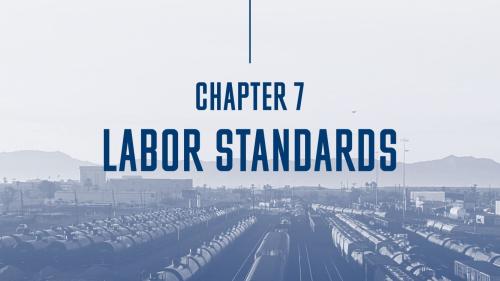This is a viewpoint from the USMCA Forward 2023 report where experts dive into the opportunities and complementary actions needed to build more integrated, resilient, and secure supply chains in North America.
 The world is confronting a number of challenges, including a global health pandemic and the Russian invasion of Ukraine. These shocks have exposed the vulnerability of the global supply chains created by decades of failed trade policy and corporate-driven globalization, resulting in shortages of critical supplies and manufacturing inputs and amplifying inflation.
The world is confronting a number of challenges, including a global health pandemic and the Russian invasion of Ukraine. These shocks have exposed the vulnerability of the global supply chains created by decades of failed trade policy and corporate-driven globalization, resulting in shortages of critical supplies and manufacturing inputs and amplifying inflation.
The Biden–Harris Administration has advanced a bold plan to strengthen America’s resilience against the costly supply disruptions that have placed workers’ and our families’ health and safety at risk, idled major manufacturing plants, and exposed significant threats to our economic and national security. Building on an early executive order on the U.S. supply chains, together with commitments on domestic manufacturing and workers’ rights, the administration and Congress have enacted a set of policies aimed at achieving a coherent industrial strategy—one long overdue to make us competitive with other major manufacturing economies and to address decades of job loss and economic dislocation. These actions include:
- Supply-side incentives to establish, retool, or expand U.S. manufacturing capacity in economically critical and emerging sectors. This includes, for example, semiconductors and semiconductor components (through the CHIPS and Science Act); battery components and materials (through the bipartisan infrastructure law); the manufacture and production of critical minerals; and offshore wind, solar, and battery components; and other clean energy technologies (through the very substantial manufacturing tax credit provisions of the Inflation Reduction Act).
- Demand-side incentives that require, encourage, or reward domestic procurement in major infrastructure investments, and increased domestic content in publicly supported energy investments.
- Strengthened labor standards, community benefit, and targeted investment requirements across these policies—including key tax credits—to help set industries on equitable high-wage pathways.
- Agency attention to the details of implementation, including the meaningful engagement of labor and community stakeholders.
The success of this effort also depends on advancing a complementary trade agenda that supports domestic manufacturing, supply chain resiliency, and strong commitments to uphold fundamental labor and environmental standards. The United States–Mexico–Canada Agreement (USMCA) can be a critical starting point in developing trade policy that can support resilient and sustainable supply chains, bolster domestic manufacturing, and create good jobs in America.
Resilient, sustainable supply chains must be built on a foundation of respect for internationally recognized workers’ rights. The USMCA recognizes this principle by containing the strongest labor provisions in any trade agreement backed up by an innovative facility-specific “rapid response” mechanism (RRM) to hold companies accountable. Under the RRM, companies that fail to respect the new Mexican labor law guaranteeing workers’ right to organize and bargain collectively risk paying higher tariff rates or even losing access to the U.S. market altogether. The mechanism has already proven to be a potent enforcement tool: In all six cases in which the Biden administration has invoked the RRM, it has delivered meaningful results for Mexican workers, including job reinstatements, back pay, and the growth of independent trade unions that have successfully negotiated new collective bargaining agreements raising wages and standards.
The USMCA also recognizes the importance of the North American automotive industry, which supports more than 7 million jobs across the region, by adopting strong rules of origin (ROO) to ensure the cars and trucks that qualify for duty-free treatment are largely made with content from North America. When fully phased in, it will require 75 percent of a vehicle to be made with content sourced from North America. In addition, it requires that nearly half of the vehicle be made by workers who make at least $16 per hour on average. Together, the strong auto ROO and wage requirement signal a welcome change where trade policy complements industrial policy, rather than undermining it. These USMCA provisions make great strides in rolling back decades of anti-worker trade policies and incorporating strong, enforceable labor standards that must be included in future international trade and commercial agreements.
Worker-centered trade policy, properly crafted and strongly enforced, is meant to, and must, address the needs of workers throughout the region and the world. In the U.S., it should be partnered with commonsense policies and incentives to reshore critical manufacturing capacity that strengthens the U.S. economy, creates good-paying U.S. jobs, and bakes resilience into the supply chain to minimize the economic jolts that have rocked the economy and working families over the past few years. All too often, past efforts to innovate, build or sustain domestic manufacturing in key sectors—in steel, aluminum, solar or batteries, for example—have been undermined by rigid, neoliberal trade rules that encourage offshoring and outsourcing.
While there is still plenty of room for improvement and innovation, the USMCA model—coupled with the bipartisan infrastructure law, the Inflation Reduction Act, and the CHIPS and Science Act investments in addressing known gaps in domestic regional automotive supply chains— provides a welcome course correction. As the recent USMCA rules of origin decision weakening the regional content requirements for vehicles to trade tariff free shows, these first of a kind policies won’t always get everything right and must be developed and written with care.
However, with the effective implementation of complementary trade and domestic manufacturing policy, we have the opportunity to reverse the all-too-familiar narrative of job loss from technological change and turn a generational shift in a critical industry into an engine of economic recovery that protects and reshores jobs and manufacturing, fills dangerous supply chain gaps, and improves conditions for workers at home and abroad.







Commentary
Raising labor standards: A means towards a more competitive North America
Tuesday, February 28, 2023